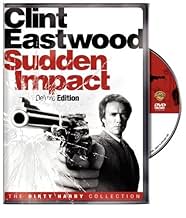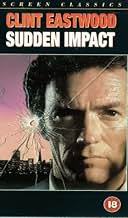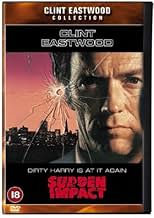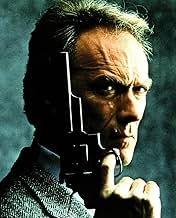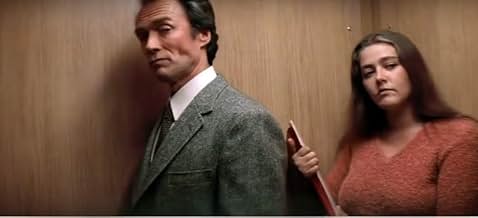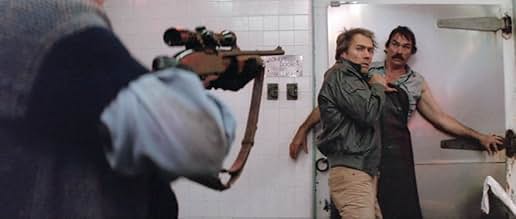NOTE IMDb
6,6/10
51 k
MA NOTE
Dans une petite ville aux abords de San Francisco, la victime d'un viol se venge de ses agresseurs. L'inspecteur Harry Callahan, suspendu pour avoir de nouveau mis en colère ses supérieurs, ... Tout lireDans une petite ville aux abords de San Francisco, la victime d'un viol se venge de ses agresseurs. L'inspecteur Harry Callahan, suspendu pour avoir de nouveau mis en colère ses supérieurs, se retrouve en charge de l'affaire.Dans une petite ville aux abords de San Francisco, la victime d'un viol se venge de ses agresseurs. L'inspecteur Harry Callahan, suspendu pour avoir de nouveau mis en colère ses supérieurs, se retrouve en charge de l'affaire.
- Réalisation
- Scénario
- Casting principal
- Récompenses
- 3 nominations au total
Audrie Neenan
- Ray Parkins
- (as Audrie J. Neenan)
Avis à la une
Sudden Impact is the most unusual of the five Dirty Harry movies, but that doesn't make it the best. However, after the rather flat and comic-book heroics of the third film, The Enforcer, it's good to see some changes to the formula. Sudden Impact is quite a dark, moody piece of cinema with big emphasis on character. Yes, there's action, but the action in this one is only one piece of the jigsaw whereas in some of the other Dirty Harry outings the action was everything.
Harry Callahan (Eastwood) is in hot water with his superiors for carrying out an illegal search on a suspicious car. The young thugs he arrested are released because of the lack of evidence, and they set out to take revenge on Harry. However, Harry is a tough nut to crack - and pretty soon he is striking back in his own destructive style. Harry's boss decides to get Harry out of town for a while to avoid further bloodshed, so he assigns him to a quiet murder investigation in an isolated coastal town. Harry pieces together the mystery and discovers that the killer is a female artist (Locke) who is bumping off a bunch of drop-outs who gang-raped her and her sister years previously. Should he arrest her for the killings, or should he turn a blind eye and let her do away with these repellent scum-bags?
The film is probably the second best in the series (the original is always going to be considered the best). Peculiarly, it is the only Dirty Harry movie upon which Eastwood also doubled up as director. It isn't a whole success, with some needless scenes (what's the point of the sequence detailing the hold-up of a coffee shop?) and a couple of overly hammy performances by the main villains (especially the trailer trash redhead). On the whole, though, this is a very interesting and unusual addition to the series which gets by on the strength of being totally different to all the other four episodes.
Harry Callahan (Eastwood) is in hot water with his superiors for carrying out an illegal search on a suspicious car. The young thugs he arrested are released because of the lack of evidence, and they set out to take revenge on Harry. However, Harry is a tough nut to crack - and pretty soon he is striking back in his own destructive style. Harry's boss decides to get Harry out of town for a while to avoid further bloodshed, so he assigns him to a quiet murder investigation in an isolated coastal town. Harry pieces together the mystery and discovers that the killer is a female artist (Locke) who is bumping off a bunch of drop-outs who gang-raped her and her sister years previously. Should he arrest her for the killings, or should he turn a blind eye and let her do away with these repellent scum-bags?
The film is probably the second best in the series (the original is always going to be considered the best). Peculiarly, it is the only Dirty Harry movie upon which Eastwood also doubled up as director. It isn't a whole success, with some needless scenes (what's the point of the sequence detailing the hold-up of a coffee shop?) and a couple of overly hammy performances by the main villains (especially the trailer trash redhead). On the whole, though, this is a very interesting and unusual addition to the series which gets by on the strength of being totally different to all the other four episodes.
The vigilante has long held a fascination for audiences, inasmuch as it evokes a sense of swift, sure justice; good triumphs over evil and the bad guy gets his deserts. It is, in fact, one of the things that has made the character of Dirty Harry Callahan (as played by Clint Eastwood) so popular. He carries a badge and works within the law, but at heart, Harry is a vigilante, meting out justice `his' way, which often puts him in conflict with his own superiors, as well as the criminals he's pursuing. But it's what draws the audience; anyone who's ever been bogged down in bureaucratic nonsense of one kind or another, delights in seeing someone cut through the red tape and get on with it-- even if it's only on the screen. And that satisfaction derived from seeing justice done-- and quickly-- is one of the elements that makes `Sudden Impact,' directed by and starring Eastwood, so successful. In this one, the fourth of the series, while working a homicide, Harry encounters a bona fide vigilante at work-- an individual whose brand of justice parallels his own, with one exception: Whoever it is, he's definitely not carrying a badge.
In his own inimitable way, Inspector Callahan has once again ended up on the bad side of the department and is ordered to take some vacation time. So he does; as only `Dirty Harry' can. In a small town north of San Francisco, Harry finds himself smack dab in the middle of a homicide case, which he quickly links to a recent murder in San Francisco because of the unique M.O. employed by the perpetrator. Unaccountably, Harry encounters resistance from the local Police Chief, Jannings (Pat Hingle), who advises him to take his big city tactics and methods elsewhere. Not one to be deterred, however, Harry continues his investigation, which ultimately involves a beautiful and talented young artist, Jennifer Spencer (Sondra Locke). Gradually, Harry discovers a link between the victims; the burning question, though, is where does Jennifer Spencer fit into the picture?
Eastwood is in top form here, both in front of and behind the camera, and it is arguably the second best of the five-film series, right behind the original `Dirty Harry.' It had been seven years since the last `Harry' offering (`The Enforcer,' 1976), but Eastwood steps right back into the character with facility and renewed vigor. And this one definitely benefits from having him in the director's chair, as he is able to recapture the essence of, not only his own character, but that `spirit' that made these films so successful, and he does it by knowing the territory and establishing a continuity that all but erases that seven year gap between #s 3 and 4. As with all the films he directs, Eastwood sets a deliberate pace that works perfectly for this material and creates just enough tension to keep it interesting and involving from beginning to end.
The screenplay, by Joseph Stinson, is well written and formulated to that distinctive `Dirty Harry' style; the dialogue is snappy and the story itself (conceived by Charles B. Pierce and Earl E. Smith) is the most engaging since the original `Dirty Harry,' as it successfully endeavors to play upon the very personal aspects of the drama, rather than entirely upon the action. The characters are well drawn and convincing, and, of course, this is the film that gave us one of Harry's best catch-phrases: `Go, ahead-- make my day...'
As Harry, Clint Eastwood perfectly embodies all of the elements that make this character so popular: He lives by a personal moral code, a true individual made of the kind of stuff we envision as that of the pioneers who settled this country and made America what it is today. Harry personifies that sense of freedom and justice we all strive for and hold so dear, possibly more so today than ever before. No matter who we are or where we come from, there's undeniably a part of us that wants to be Harry, or at least have him around. `Dirty Harry' is an icon of the cinema, and it's impossible to envision anyone but Eastwood portraying him; for better or worse, Eastwood `is' Dirty Harry, without question, just as Sean Connery is James Bond and Basil Rathbone, Sherlock Holmes.
Sondra Locke is entirely effective here in the role of Jennifer Spencer, a young woman wronged and out for vengeance, or as she sees it, `justice.' She manages to bring a hard-edged determination laced with vulnerability to her character, with a convincing, introspective approach that is far beyond what is typical of the `action' genre. Even amid the violence, Locke keeps her focus on Jennifer and the traumatic events that have brought her to this stage of her life. Her portrayal makes a perfect complement to Eastwood's Harry, and becomes, in philosophy and deed, something of his counterpart.
In supporting roles, two performances stand out: Paul Drake, as Mick, creates the best `psycho' since Andy Robinson's dynamic portrayal of the serial killer in the original `Dirty Harry.' With actually very limited screen time, Drake establishes a genuinely disconcerting presence that is believable and convincing, which adds much to the purely visceral response of the audience. This is the guy you can't wait to see Harry take care of in the end. Also effective is Audrie J. Neenan, who makes her character, Ray Parkins, the epitome of the proverbial `low life,' who can be found in any bar in any city. It's a performance that evokes a gut-level response, and it adds greatly to the credibility of the film, in that it helps provide that necessary sense of realism.
The supporting cast includes Albert Popwell (Horace), Mark Kevloun (Bennett) and Nancy Parsons (Mrs. Kruger). With a perfect blend of drama and action, `Sudden Impact' dispenses justice that is a fulfilling respite from reality; the perfect justice of a not-so-perfect world, that makes for a satisfying cinematic experience. 9/10.
In his own inimitable way, Inspector Callahan has once again ended up on the bad side of the department and is ordered to take some vacation time. So he does; as only `Dirty Harry' can. In a small town north of San Francisco, Harry finds himself smack dab in the middle of a homicide case, which he quickly links to a recent murder in San Francisco because of the unique M.O. employed by the perpetrator. Unaccountably, Harry encounters resistance from the local Police Chief, Jannings (Pat Hingle), who advises him to take his big city tactics and methods elsewhere. Not one to be deterred, however, Harry continues his investigation, which ultimately involves a beautiful and talented young artist, Jennifer Spencer (Sondra Locke). Gradually, Harry discovers a link between the victims; the burning question, though, is where does Jennifer Spencer fit into the picture?
Eastwood is in top form here, both in front of and behind the camera, and it is arguably the second best of the five-film series, right behind the original `Dirty Harry.' It had been seven years since the last `Harry' offering (`The Enforcer,' 1976), but Eastwood steps right back into the character with facility and renewed vigor. And this one definitely benefits from having him in the director's chair, as he is able to recapture the essence of, not only his own character, but that `spirit' that made these films so successful, and he does it by knowing the territory and establishing a continuity that all but erases that seven year gap between #s 3 and 4. As with all the films he directs, Eastwood sets a deliberate pace that works perfectly for this material and creates just enough tension to keep it interesting and involving from beginning to end.
The screenplay, by Joseph Stinson, is well written and formulated to that distinctive `Dirty Harry' style; the dialogue is snappy and the story itself (conceived by Charles B. Pierce and Earl E. Smith) is the most engaging since the original `Dirty Harry,' as it successfully endeavors to play upon the very personal aspects of the drama, rather than entirely upon the action. The characters are well drawn and convincing, and, of course, this is the film that gave us one of Harry's best catch-phrases: `Go, ahead-- make my day...'
As Harry, Clint Eastwood perfectly embodies all of the elements that make this character so popular: He lives by a personal moral code, a true individual made of the kind of stuff we envision as that of the pioneers who settled this country and made America what it is today. Harry personifies that sense of freedom and justice we all strive for and hold so dear, possibly more so today than ever before. No matter who we are or where we come from, there's undeniably a part of us that wants to be Harry, or at least have him around. `Dirty Harry' is an icon of the cinema, and it's impossible to envision anyone but Eastwood portraying him; for better or worse, Eastwood `is' Dirty Harry, without question, just as Sean Connery is James Bond and Basil Rathbone, Sherlock Holmes.
Sondra Locke is entirely effective here in the role of Jennifer Spencer, a young woman wronged and out for vengeance, or as she sees it, `justice.' She manages to bring a hard-edged determination laced with vulnerability to her character, with a convincing, introspective approach that is far beyond what is typical of the `action' genre. Even amid the violence, Locke keeps her focus on Jennifer and the traumatic events that have brought her to this stage of her life. Her portrayal makes a perfect complement to Eastwood's Harry, and becomes, in philosophy and deed, something of his counterpart.
In supporting roles, two performances stand out: Paul Drake, as Mick, creates the best `psycho' since Andy Robinson's dynamic portrayal of the serial killer in the original `Dirty Harry.' With actually very limited screen time, Drake establishes a genuinely disconcerting presence that is believable and convincing, which adds much to the purely visceral response of the audience. This is the guy you can't wait to see Harry take care of in the end. Also effective is Audrie J. Neenan, who makes her character, Ray Parkins, the epitome of the proverbial `low life,' who can be found in any bar in any city. It's a performance that evokes a gut-level response, and it adds greatly to the credibility of the film, in that it helps provide that necessary sense of realism.
The supporting cast includes Albert Popwell (Horace), Mark Kevloun (Bennett) and Nancy Parsons (Mrs. Kruger). With a perfect blend of drama and action, `Sudden Impact' dispenses justice that is a fulfilling respite from reality; the perfect justice of a not-so-perfect world, that makes for a satisfying cinematic experience. 9/10.
A rape victim is going around, bumping off her attackers one by one, having been denied justice originally. A rather unconventional detective, Callahan is put on the case.. but whose side will he take?
This is one of the most brutal films I've seen in quite some time. Virtually every scene seems to be a set-up for some punks to make the mistake of annoying our hero, who then proceeds to beat the living daylights out of them, or simply blows their heads off. I am 100% convinced that if any serving officer did what the Eastwood character gets away with in this film, he would not only be stripped of his badge, but also be looking at a considerable stretch in prison. Another striking aspect of the picture is the violence used against the fairer sex. The female cast members get punched in the face, kicked when on they're on the ground.. And that doesn't even include the constant flashbacks we get of Sondra Locke's sexual assault ordeal (We get one every time she carries out one of her revenge attacks on her aggressors). The misogyny displayed on screen is incredible and is unlikely to endear itself to anyone concerned about domestic violence.
So why am I recommending it? Well for a start, the film is well directed, with some very exciting gunfights and car chases which will keep you on the edge of your seat. But the main reason for watching is Clint himself, the evergreen icon giving us another classy performance as a veteran cop who might not share the ethics of the modern police force, but tends to do the job 10x better than his colleagues who do it all 'by the book'. If only we had someone like that here in Britain, perhaps this country wouldn't be the crime hotspot it is these days.. 6/10
This is one of the most brutal films I've seen in quite some time. Virtually every scene seems to be a set-up for some punks to make the mistake of annoying our hero, who then proceeds to beat the living daylights out of them, or simply blows their heads off. I am 100% convinced that if any serving officer did what the Eastwood character gets away with in this film, he would not only be stripped of his badge, but also be looking at a considerable stretch in prison. Another striking aspect of the picture is the violence used against the fairer sex. The female cast members get punched in the face, kicked when on they're on the ground.. And that doesn't even include the constant flashbacks we get of Sondra Locke's sexual assault ordeal (We get one every time she carries out one of her revenge attacks on her aggressors). The misogyny displayed on screen is incredible and is unlikely to endear itself to anyone concerned about domestic violence.
So why am I recommending it? Well for a start, the film is well directed, with some very exciting gunfights and car chases which will keep you on the edge of your seat. But the main reason for watching is Clint himself, the evergreen icon giving us another classy performance as a veteran cop who might not share the ethics of the modern police force, but tends to do the job 10x better than his colleagues who do it all 'by the book'. If only we had someone like that here in Britain, perhaps this country wouldn't be the crime hotspot it is these days.. 6/10
Sudden Impact was the fourth instalment in the 'Dirty Harry' series and the only one in which Clint Eastwood not only starred in but directed as well. This time, Harry Callahan is sent up the coast by his superiors to investigate a series of murders that are connected to a small ocean side resort town.
I reckon this may well be the third best entry in the series after the peerless first instalment and its follow-up Magnum Force (1973). Unlike the other two in the series, this one has a more interesting plot-line which involves a vigilante killer played by Eastwood regular actress Sandra Locke. She almost shares top-billing with him here such is the prominence of her role. She plays by far the most sympathetic villain in the series, one who dispatches a series of truly vile characters who assaulted her and her now comatose sister ten years previously. It's the very fact that the role has been written with a lot more depth that contributes to the audience empathising with her, while still knowing that she is committing a series of murders. This dramatic tension is underpinned by the theme of how ineffective and corrupt the justice system can be, leading to victims taking the law into their own hands.
This is probably the entry in the series that most veers into psychological thriller territory and I think this change does work in its favour. However, its bread and butter is still action and it hardly falls short on that score. There is an ongoing plot thread which has Callahan continually targeted by Mob hit-men who want him dead for an earlier infraction he instigated against one of their big bosses. Not only this but he also has high adrenaline encounters with three other sets of different criminals. It could be argued, however, that in its latter stages the film went too much in the direction of having villains acting like half-wits allowing for Callahan to escape their clutches and return to defeat them, while the finale in the fun-park felt a little too simplistically cheesy. But, these small gripes aside, I thought this to be a pretty fine effort for a fourth instalment in a film series and a pretty good film in its own right overall.
I reckon this may well be the third best entry in the series after the peerless first instalment and its follow-up Magnum Force (1973). Unlike the other two in the series, this one has a more interesting plot-line which involves a vigilante killer played by Eastwood regular actress Sandra Locke. She almost shares top-billing with him here such is the prominence of her role. She plays by far the most sympathetic villain in the series, one who dispatches a series of truly vile characters who assaulted her and her now comatose sister ten years previously. It's the very fact that the role has been written with a lot more depth that contributes to the audience empathising with her, while still knowing that she is committing a series of murders. This dramatic tension is underpinned by the theme of how ineffective and corrupt the justice system can be, leading to victims taking the law into their own hands.
This is probably the entry in the series that most veers into psychological thriller territory and I think this change does work in its favour. However, its bread and butter is still action and it hardly falls short on that score. There is an ongoing plot thread which has Callahan continually targeted by Mob hit-men who want him dead for an earlier infraction he instigated against one of their big bosses. Not only this but he also has high adrenaline encounters with three other sets of different criminals. It could be argued, however, that in its latter stages the film went too much in the direction of having villains acting like half-wits allowing for Callahan to escape their clutches and return to defeat them, while the finale in the fun-park felt a little too simplistically cheesy. But, these small gripes aside, I thought this to be a pretty fine effort for a fourth instalment in a film series and a pretty good film in its own right overall.
It's a strange thing to see a film where some scenes work rather weakly (if only in comparison to other films in its legacy), and others in a 'sub-plot' or supporting story are surprisingly provocative and strong. Sudden Impact is one of those cases, where Clint Eastwood as star/producer/director shows when he can be at his best, or at his lessor of times when dealing with a crime/mystery/detective story in his Dirty Harry fame. We get that 'make my day' line, and un-like in the first film where his 'do I feel lucky' speech was playful and cool the first time and the second time at the end tough as nails, here it's switched around. He gets into another shamble with the department, as usual, when he tries to fight crime 'his' way, in particular with a diner robbery (inspiration for Pulp Fiction?) and with a high speed pursuit with a senior citizen bus. He's told to 'take a vacation', and that's the last thing on his mind. This whole main plot isn't very convincing aside from the expectancy of the story and lines, which just adds to the frustration. But soon his story merges with the sub-plot that Eastwood develops from the start.
Enter Sandra Locke's character, Jennifer Spencer, whom we soon learn after some (appropriately) mysterious scenes that she and her shy sister were victims of a cruel, unjust sexual assault (err, outright rape), and is sleekly, undercover-like, getting revenge. Her scenes and story are the strongest parts of the film, the most intense, and finally when it goes into Callahan's storyline (he's getting facts in the same small town she's in on a murder), the film finally finds a focus between Eastwood's classic form of clearly defined good vs. evil (though sometimes blurred, to be sure). Eastwood films the flashbacks, not to say too much about them, expertly, in a fresh, experimental style; the trademark Lalo Schifrin score is totally atmospheric in these scenes and in others. It almost seems like a couple of times an art-house sensibility has crept into Eastwood's firmly straightforward storytelling style, which helps make the film watchable.
It's a shame, though, that in the end it goes more for the expectable (or maybe not expectable) points, and until the third act Callahan doesn't have much to do except his usual 'it's smith...Wesson...and me' shtick. However, with Locke he gets out of her a very good performance (more subtle and touching than the one in the Gauntlet) and an exciting climax at an amusement park. In a way I do and don't agree with Ebert's remark that it's like a 'music video' in Eastwood's style here. I admit there is comparisons with the simplicity of both, the directness, but the scenes where Eastwood does break form are superior to those of any music video. It's cheesy, it's hard-edged, it's not up to par with the first two 'Harry' pictures, but hey, there could be worse ways to spend a couple hours with the master of the .44.
Enter Sandra Locke's character, Jennifer Spencer, whom we soon learn after some (appropriately) mysterious scenes that she and her shy sister were victims of a cruel, unjust sexual assault (err, outright rape), and is sleekly, undercover-like, getting revenge. Her scenes and story are the strongest parts of the film, the most intense, and finally when it goes into Callahan's storyline (he's getting facts in the same small town she's in on a murder), the film finally finds a focus between Eastwood's classic form of clearly defined good vs. evil (though sometimes blurred, to be sure). Eastwood films the flashbacks, not to say too much about them, expertly, in a fresh, experimental style; the trademark Lalo Schifrin score is totally atmospheric in these scenes and in others. It almost seems like a couple of times an art-house sensibility has crept into Eastwood's firmly straightforward storytelling style, which helps make the film watchable.
It's a shame, though, that in the end it goes more for the expectable (or maybe not expectable) points, and until the third act Callahan doesn't have much to do except his usual 'it's smith...Wesson...and me' shtick. However, with Locke he gets out of her a very good performance (more subtle and touching than the one in the Gauntlet) and an exciting climax at an amusement park. In a way I do and don't agree with Ebert's remark that it's like a 'music video' in Eastwood's style here. I admit there is comparisons with the simplicity of both, the directness, but the scenes where Eastwood does break form are superior to those of any music video. It's cheesy, it's hard-edged, it's not up to par with the first two 'Harry' pictures, but hey, there could be worse ways to spend a couple hours with the master of the .44.
Le saviez-vous
- AnecdotesCharles B. Pierce wrote the line "Go ahead, make my day." The line was inspired by a warning that his father would say to Pierce when he was a child. According to Pierce, his father warned him "When I come home tonight and the yard has not been mowed, you're gonna make my day."
- GaffesAs Horace exits the car while visiting Harry, who is about to begin target shooting in the woods, one of the Panavision cameras is clearly visible, reflected in the car window, as well as Eastwood's son, who was visiting the set.
- Citations
[Callahan dares a crook to shoot his hostage]
Harry Callahan: Go ahead, make my day.
- Versions alternativesJust like with the previous movies, the 5.1 DVD/Blu-ray remix replaces a bunch of sound effects (mostly gunshots) with more modern ones. However, in addition to that right before the carnival shootout at the end, originally when Harry was approaching the villains, the music had a very loud screeching sound, but the remix completely removes it. (but remains intact on the soundtrack and foreign mono tracks)
- ConnexionsFeatured in At the Movies: Christine/Silkwood/Sudden Impact/Thriller (1983)
- Bandes originalesTHIS SIDE OF FOREVER
Performed by Roberta Flack
Music by Lalo Schifrin
Lyrics by DeWayne Blackwell (as Dewayne Blackwell)
Meilleurs choix
Connectez-vous pour évaluer et suivre la liste de favoris afin de recevoir des recommandations personnalisées
Détails
Box-office
- Budget
- 22 000 000 $US (estimé)
- Montant brut aux États-Unis et au Canada
- 67 642 693 $US
- Week-end de sortie aux États-Unis et au Canada
- 9 688 561 $US
- 11 déc. 1983
- Montant brut mondial
- 67 642 693 $US
Contribuer à cette page
Suggérer une modification ou ajouter du contenu manquant

Lacune principale
By what name was Sudden Impact - Le retour de l'inspecteur Harry (1983) officially released in India in English?
Répondre

